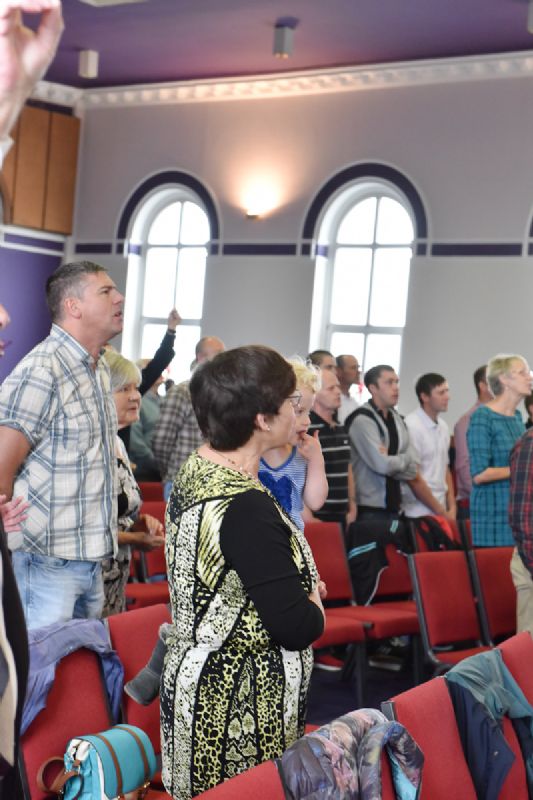In a discussion on another thread, I made an offhand remark that I found the notion of an internet forum statement of faith slightly comical, as though an internet forum were a denomination of some sort. On an entirely different forum, I once pointed out how long and complex its statement of faith was in comparison to the great creeds that have traditionally defined the Christian faith, such as the Nicene Creed and Apostles' Creed. That seems a bit odd to me, but my comparison was not well-received (to put it mildly). I can understand why the Southern Baptists or Jehovah's Witnesses might need a detailed statement of faith to distinguish what it means to be a Southern Baptist or Jehovah's Witness – but an internet forum? Anyway, the discussion on the other thread here started to become a bit heated, which wasn't my intent.
This thread isn't a criticism of this forum's statement of faith or even about this forum's statement of faith. The site owners can do whatever they want, and the one here is a fair summary of the Once Saved Always Saved branch of Protestantism. I don't see any insistence that anyone must hold that theology in order to participate, so I suppose a "This is what we believe" statement is fine if the site owners and administrators believe it serves a purpose.
(If you haven't read the Nicene and Apostles' Creeds lately, you may find them almost quaint in their simplicity. Not a word about biblical inerrancy. Indeed, not a word about the Bible! EEK!!!)
What I'm talking about here is your personal statement of faith. Have you ever thought about developing one?
When I was a member of a denomination with a detailed statement of faith, I gradually realized there were elements I strongly believed, others I "sorta kinda" believed, and a few I had to pretend to believe if I wanted to remain comfortable within the denomination. Eventually, I moved on rather than continue to pretend. It wasn't that I felt unwelcome; I simply felt uncomfortable.
Over a period of years and after pretty intense study, I developed my own statement of faith. I'm not going to share it with you, because that's not the point. It sets forth the things I genuinely believe and don't have to pretend to believe. It's shorter and more basic than the typical denominational or even internet forum statement of faith. I continually try to pare it down to what seem to me the absolute essentials, but someone else may prefer a more full-blown and detailed one.
I found developing it to be a very useful exercise. I enjoy being able to say, just to myself and God, "This is what I really believe, what I am genuinely capable of believing without doubt or pretense."
Certainly, we can't just ignore the great creeds, confessions and statements of faith and call ourselves Christians. They have defined the faith for centuries, and those who wrote them all believed they were being guided by the Holy Spirit. Yet once we get beyond the Nicene and Apostles' Creeds and into the more elaborate ones, some of them are very different on fundamental points. Hence, I have not felt it was iconoclastic or displeasing to God to examine what I personally believed, for the benefit of myself alone.
You may arrive at a personal statement of faith that meshes exactly with this forum's or the Southern Baptists' or whatever. Fine, but at least you won't simply have adopted that statement because someone told you that you must, and you will know that, yes, this is what you relieve believe and are really capable of believing. You will know that you aren't simply mouthing things you've never really even thought about because "this is what I'm told all Baptists believe, and I want to be welcome here."
Detailed statements of faith are, in my observation, inherently exclusionary: If this is what Southern Baptists believe, then if you don't believe it then you should look elsewhere. That's fine, so long as the Southern Baptists (or any other denomination) recognize that their statement of faith defines them but doesn't inevitably define what it means to be a Christian.
When I pointed out on the other thread that a Once Saved Always Saved statement of faith excludes the Orthodox, Catholics and a fair number of Protestants, another participant informed me the statement describes "God's ways." Oops, that's the trap. My personal statement of faith is my understanding of God's ways, not a definition of God's ways even in my own mind. The fact you disagree with me on elements 3 and 7 means nothing more than that – you disagree with me on those elements, not that you aren't a Christian (and, hopefully, not that I'm not a Christian in your view).
I tend to think this exercise of developing a personal statement of faith may be pretty close to what Paul meant by working out your own salvation with fear and trembling. Philippians 2:12-13. At least it's a step in that direction.
This thread isn't a criticism of this forum's statement of faith or even about this forum's statement of faith. The site owners can do whatever they want, and the one here is a fair summary of the Once Saved Always Saved branch of Protestantism. I don't see any insistence that anyone must hold that theology in order to participate, so I suppose a "This is what we believe" statement is fine if the site owners and administrators believe it serves a purpose.
(If you haven't read the Nicene and Apostles' Creeds lately, you may find them almost quaint in their simplicity. Not a word about biblical inerrancy. Indeed, not a word about the Bible! EEK!!!)
What I'm talking about here is your personal statement of faith. Have you ever thought about developing one?
When I was a member of a denomination with a detailed statement of faith, I gradually realized there were elements I strongly believed, others I "sorta kinda" believed, and a few I had to pretend to believe if I wanted to remain comfortable within the denomination. Eventually, I moved on rather than continue to pretend. It wasn't that I felt unwelcome; I simply felt uncomfortable.
Over a period of years and after pretty intense study, I developed my own statement of faith. I'm not going to share it with you, because that's not the point. It sets forth the things I genuinely believe and don't have to pretend to believe. It's shorter and more basic than the typical denominational or even internet forum statement of faith. I continually try to pare it down to what seem to me the absolute essentials, but someone else may prefer a more full-blown and detailed one.
I found developing it to be a very useful exercise. I enjoy being able to say, just to myself and God, "This is what I really believe, what I am genuinely capable of believing without doubt or pretense."
Certainly, we can't just ignore the great creeds, confessions and statements of faith and call ourselves Christians. They have defined the faith for centuries, and those who wrote them all believed they were being guided by the Holy Spirit. Yet once we get beyond the Nicene and Apostles' Creeds and into the more elaborate ones, some of them are very different on fundamental points. Hence, I have not felt it was iconoclastic or displeasing to God to examine what I personally believed, for the benefit of myself alone.
You may arrive at a personal statement of faith that meshes exactly with this forum's or the Southern Baptists' or whatever. Fine, but at least you won't simply have adopted that statement because someone told you that you must, and you will know that, yes, this is what you relieve believe and are really capable of believing. You will know that you aren't simply mouthing things you've never really even thought about because "this is what I'm told all Baptists believe, and I want to be welcome here."
Detailed statements of faith are, in my observation, inherently exclusionary: If this is what Southern Baptists believe, then if you don't believe it then you should look elsewhere. That's fine, so long as the Southern Baptists (or any other denomination) recognize that their statement of faith defines them but doesn't inevitably define what it means to be a Christian.
When I pointed out on the other thread that a Once Saved Always Saved statement of faith excludes the Orthodox, Catholics and a fair number of Protestants, another participant informed me the statement describes "God's ways." Oops, that's the trap. My personal statement of faith is my understanding of God's ways, not a definition of God's ways even in my own mind. The fact you disagree with me on elements 3 and 7 means nothing more than that – you disagree with me on those elements, not that you aren't a Christian (and, hopefully, not that I'm not a Christian in your view).
I tend to think this exercise of developing a personal statement of faith may be pretty close to what Paul meant by working out your own salvation with fear and trembling. Philippians 2:12-13. At least it's a step in that direction.




